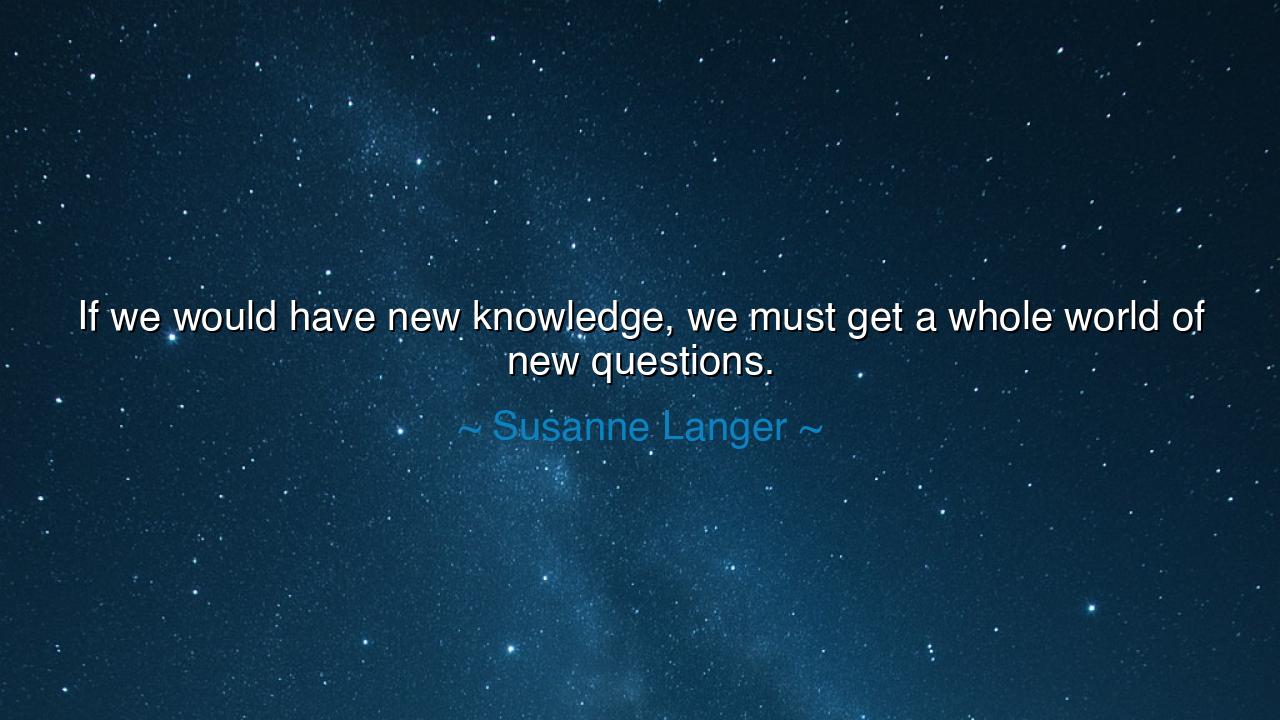
If we would have new knowledge, we must get a whole world of new






Listen, O seeker of wisdom, to the luminous words of Susanne Langer, the philosopher of mind and meaning: “If we would have new knowledge, we must get a whole world of new questions.” This saying, though simple in its phrasing, contains a depth that stretches beyond the boundaries of time and thought. It reminds us that knowledge does not arise from certainty, but from curiosity — that truth begins not with answers, but with wonder. The wise know that to question is not to doubt, but to awaken.
The meaning of this quote lies in the sacred relationship between curiosity and growth. Every age believes itself wise, yet the next age finds its wisdom wanting. Why? Because the questions of one generation become the assumptions of the next. To seek new knowledge is to break free from inherited comfort — to refuse stagnation. A stagnant mind clings to answers; a living mind thirsts for better questions. Thus, Langer reminds us that progress is not the polishing of old truths, but the discovery of unseen realms that only fresh inquiry can reveal.
The origin of her thought is rooted in her lifelong study of symbolism, art, and human understanding. Susanne Langer, one of the great philosophers of the 20th century, believed that knowledge is not a fixed monument but a growing organism. In her work Philosophy in a New Key (1942), she explored how language, art, and emotion shape the very way we think. Her insight — that new ideas require new questions — was born from observing how the sciences and humanities evolve not by perfecting what they know, but by daring to ask what they have not yet imagined. Her voice joins that of every seeker who ever looked beyond the known and whispered, “What if?”
History, too, gives proof of her wisdom. When Isaac Newton saw the apple fall, he did not ask, “Why do apples fall?” — that was already known. He asked, “Why does everything fall?” That single, expanded question gave birth to the law of universal gravitation. When Marie Curie wondered what lay inside invisible rays, her question tore through the veil of matter itself and opened the age of radioactivity. And when Einstein, unsatisfied with the old questions of motion, asked, “What is the nature of time and space themselves?” — the universe unfolded anew before him. Every leap in human progress has begun not with an answer, but with a question no one dared to ask before.
The ancients understood this power well. In the schools of Athens, Socrates walked barefoot through the marketplace, not to teach but to ask — “What is justice? What is virtue? What is good?” His questions unsettled the comfortable, yet from his questioning was born the entire tradition of Western philosophy. The Oracle of Delphi declared him the wisest of men, not because he possessed knowledge, but because he knew how little he knew. So too does Langer’s quote echo that Socratic spirit — that humility before the vastness of truth which keeps the mind alive and the soul aflame.
To live this wisdom, one must learn to love questions as dearly as answers. In your life, ask not merely “How can I succeed?” but “What is success?” Ask not “How can I be happy?” but “What does happiness mean?” In art, in science, in faith — question the foundations, not just the walls. For every question honestly asked opens a door that was once invisible. The unasked question is a prison; the asked one, a key.
Thus, O listener, learn the rhythm of inquiry. Do not fear uncertainty; it is the breath of discovery. Let your curiosity be relentless, your wonder childlike, your search eternal. Each new question you ask is a torch lighting the path of humanity forward. And remember: answers grow old, but questions are immortal.
So take this teaching of Susanne Langer as your compass — to seek not the end of knowledge, but the beginning of deeper wonder. For only by daring to question the world as it is, may we one day glimpse the world as it could be.






AAdministratorAdministrator
Welcome, honored guests. Please leave a comment, we will respond soon